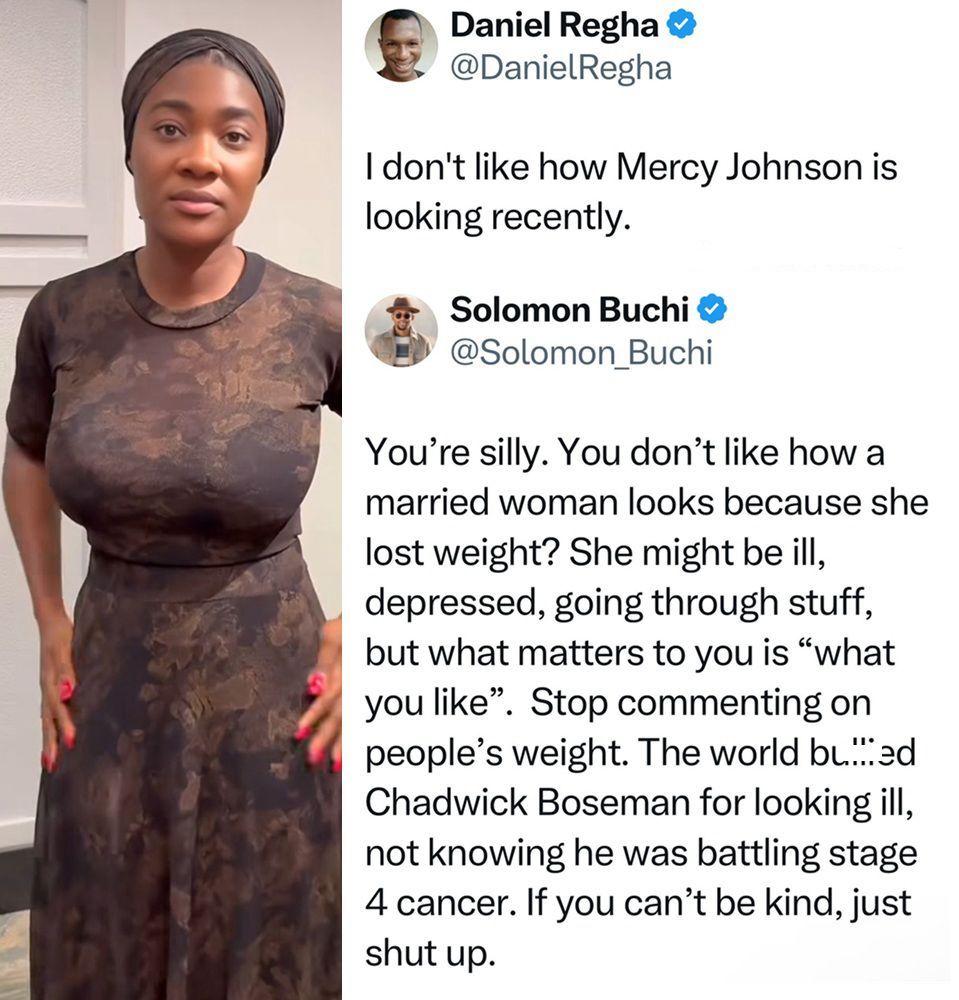
Solomon Buchi Schools Daniel Regha After Comment on Mercy Johnson's Appearance Sparks Backlash

Social media once again turned into a battleground of opinions as writer and life coach Solomon Buchi firmly clapped back at popular Twitter commentator Daniel Regha for making an unsolicited remark about Nollywood star Mercy Johnson’s recent appearance. Regha, known for his controversial takes on celebrities, stirred outrage when he posted, “I don’t like how Mercy Johnson is looking recently,” a tweet that many have labeled unnecessary and insensitive. But it was Solomon Buchi’s fiery and thoughtful response that shifted the conversation, offering not just a defense of the actress, but a deeper reflection on body shaming, empathy, and the need for compassion in public discourse.
Buchi did not mince words in his reply. “You’re silly,” he began, immediately calling out the audacity of Regha’s comment. “You don’t like how a married woman looks because she lost weight? She might be ill, depressed, going through stuff, but what matters to you is 'what you like.' Stop commenting on people’s weight.” His response struck a chord with many Nigerians who felt the need to remind social media users that behind every public figure is a real person with struggles, insecurities, and private battles.
Buchi’s mention of the late actor Chadwick Boseman drove the message home even more powerfully. Boseman, who was secretly battling stage 4 colon cancer, faced online ridicule and cruel comments about his appearance before his passing in 2020. "The world bullied Chadwick Boseman for looking ill, not knowing he was battling stage 4 cancer," Buchi wrote. "If you can't be kind, just shut up." His words echoed across the timeline, quickly gaining traction as many joined in to decry the habit of body policing and insensitive commentary that plagues public platforms.
Regha’s original post, brief as it was, carried the weight of entitlement—a sense that a celebrity’s appearance exists for public consumption and approval. But Buchi’s response dismantled that entitlement with a rare blend of bluntness and empathy. In an online culture where “hot takes” often win likes and retweets, his message served as a sobering reminder that not every opinion needs to be voiced, especially when it concerns someone else’s body.
Mercy Johnson, a beloved figure in Nollywood with a career spanning over a decade, has built a reputation not just for her acting chops but for being a strong, graceful woman navigating motherhood and stardom. Her recent photos, which show a visibly slimmer figure, had already sparked conversations among fans, with some expressing concern and others simply curious. But no clear explanation has been given by the actress herself, and frankly, none is owed. Whether she’s on a fitness journey, managing a health condition, or simply evolving through life’s phases, Johnson deserves the privacy and dignity to do so without being reduced to “likes” or “dislikes.”
Social media has made it easy for people to make sweeping judgments from behind screens, but this incident reveals how damaging those casual remarks can be. Buchi’s public defense of Mercy Johnson underscores a much-needed cultural shift—one where people are held accountable for the way they speak about others, especially on something as personal as body image. His no-nonsense tone may have ruffled some feathers, but it was effective in cutting through the noise and spotlighting the real issue: the lack of empathy in our digital interactions.
The backlash against Regha was swift and widespread. While some of his followers defended his right to have an opinion, the overwhelming majority sided with Buchi, praising him for standing up against what many saw as a needless and tone-deaf comment. Comment sections across platforms were flooded with similar sentiments: “This is exactly how people get bullied into depression,” one user wrote. “Thank you, Solomon Buchi, for saying what needed to be said,” another added.
This incident also reopens the conversation about how society, particularly in Nigeria, treats women’s bodies. From constant scrutiny over weight gain or loss to judgments about appearance after childbirth, women in the public eye are often subjected to impossible standards. Mercy Johnson is not the first, and unfortunately, may not be the last. But moments like this provide an opportunity to challenge the status quo and demand better—more kindness, more understanding, more silence when needed.
It’s also a call to influencers and public figures like Regha, who command large followings, to use their platforms responsibly. Words have power, and even a short tweet can have long-lasting effects on someone’s mental health. The internet never forgets, but it can also forgive—and grow—when conversations like this prompt reflection and change.
Solomon Buchi, for his part, has consistently used his platform to discuss difficult but necessary topics, from relationships and self-worth to morality and mental health. His intervention in this case is a continuation of that mission—to inject humanity into online spaces where it often gets lost. And it seems the public agrees. His tweet gained massive support, with many reposting it alongside personal stories of being judged or misunderstood due to changes in their physical appearance.
As for Mercy Johnson, she has not responded to the exchange, and perhaps she doesn’t need to. Her silence speaks volumes in a world that often demands explanation from women for simply existing. Her worth, talent, and impact remain unchanged, and this moment may serve as yet another reminder of her quiet strength.
In the end, Buchi’s message cuts across more than just a defense of a fellow celebrity. It’s a wake-up call. The next time you’re tempted to comment on someone’s body, ask yourself: Do I know what they’re going through? Is my opinion necessary? And most importantly, am I being kind? If not, then, as Solomon Buchi wisely said, just shut up.


